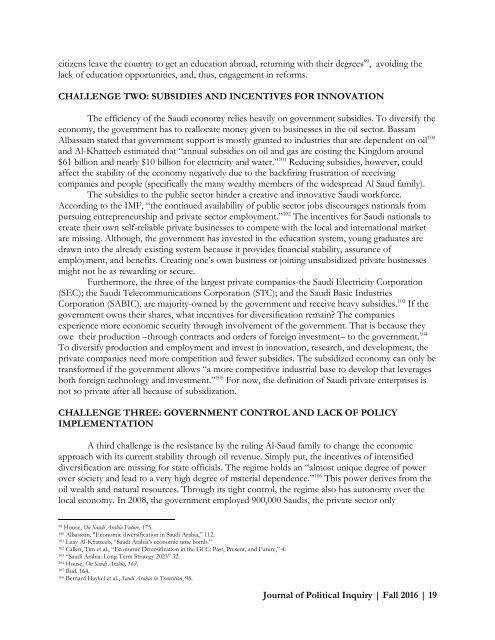Fall2016_Final
You also want an ePaper? Increase the reach of your titles
YUMPU automatically turns print PDFs into web optimized ePapers that Google loves.
citizens leave the country to get an education abroad, returning with their degrees 99 , avoiding the<br />
lack of education opportunities, and, thus, engagement in reforms.<br />
CHALLENGE TWO: SUBSIDIES AND INCENTIVES FOR INNOVATION<br />
The efficiency of the Saudi economy relies heavily on government subsidies. To diversify the<br />
economy, the government has to reallocate money given to businesses in the oil sector. Bassam<br />
Albassam stated that government support is mostly granted to industries that are dependent on oil 100<br />
and Al-Khatteeb estimated that “annual subsidies on oil and gas are costing the Kingdom around<br />
$61 billion and nearly $10 billion for electricity and water.” 101 Reducing subsidies, however, could<br />
affect the stability of the economy negatively due to the backfiring frustration of receiving<br />
companies and people (specifically the many wealthy members of the widespread Al Saud family).<br />
The subsidies to the public sector hinder a creative and innovative Saudi workforce.<br />
According to the IMF, “the continued availability of public sector jobs discourages nationals from<br />
pursuing entrepreneurship and private sector employment.” 102 The incentives for Saudi nationals to<br />
create their own self-reliable private businesses to compete with the local and international market<br />
are missing. Although, the government has invested in the education system, young graduates are<br />
drawn into the already existing system because it provides financial stability, assurance of<br />
employment, and benefits. Creating one’s own business or joining unsubsidized private businesses<br />
might not be as rewarding or secure.<br />
Furthermore, the three of the largest private companies-the Saudi Electricity Corporation<br />
(SEC); the Saudi Telecommunications Corporation (STC); and the Saudi Basic Industries<br />
Corporation (SABIC), are majority-owned by the government and receive heavy subsidies. 103 If the<br />
government owns their shares, what incentives for diversification remain? The companies<br />
experience more economic security through involvement of the government. That is because they<br />
owe their production –through contracts and orders of foreign investment– to the government. 104<br />
To diversify production and employment and invest in innovation, research, and development, the<br />
private companies need more competition and fewer subsidies. The subsidized economy can only be<br />
transformed if the government allows “a more competitive industrial base to develop that leverages<br />
both foreign technology and investment.” 105 For now, the definition of Saudi private enterprises is<br />
not so private after all because of subsidization.<br />
CHALLENGE THREE: GOVERNMENT CONTROL AND LACK OF POLICY<br />
IMPLEMENTATION<br />
A third challenge is the resistance by the ruling Al-Saud family to change the economic<br />
approach with its current stability through oil revenue. Simply put, the incentives of intensified<br />
diversification are missing for state officials. The regime holds an “almost unique degree of power<br />
over society and lead to a very high degree of material dependence.” 106 This power derives from the<br />
oil wealth and natural resources. Through its tight control, the regime also has autonomy over the<br />
local economy. In 2008, the government employed 900,000 Saudis, the private sector only<br />
99<br />
House, On Saudi Arabia Future, 175.<br />
100<br />
Albassam, "Economic diversification in Saudi Arabia,” 112.<br />
101<br />
Luay Al-Khatteeb, “Saudi Arabia’s economic time bomb.”<br />
102<br />
Callen, Tim et al., “Economic Diversification in the GCC: Past, Present, and Future,” 4.<br />
103<br />
“Saudi Arabia: Long-Term Strategy 2025” 32.<br />
104<br />
House, On Saudi Arabia, 163.<br />
105<br />
Ibid. 164.<br />
106<br />
Bernard Haykel et al., Saudi Arabia in Transition, 98.<br />
Journal of Political Inquiry | Fall 2016 | 19
















